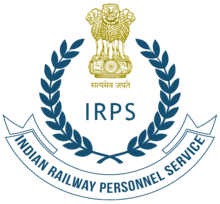Indian Railway Personnel Service
 | |
| Service Overview | |
|---|---|
| Abbreviation | IRPS |
| Formed | 1980 |
| Headquarters |
Rail Bhavan New Delhi |
| Country |
|
| Training Academy | National Academy of Indian Railways (Vadodara) |
| Controlling Authority | Ministry of Railways, Government of India |
| Cadre Size | 404 |
| Service Chief | |
| Member Staff, Railway Board | Shri Pradeep Kumar |
| Head of the Civil Services | |
| Cabinet Secretary | Current: Pradeep Kumar Sinha |
The Indian Railway Personnel Service (IRPS) is a cadre of the Group-A services of the Government of India. The officers of this service are responsible for managing the Human Resources of the Indian Railways which has a work force of about 1.4 million employees.
Recruitment
The recruitment to the cadre is done through the Civil Services Examination.The first recruitment to the cadre was done by UPSC in the year 1980.Prior to that some officers of sister cadres had joined the service on option basis. After selection, the IRPS probationers undergo general foundation training at one of the training academies, that is, Lal Bahadur Shastri National Academy of Administration (LBSNAA) National Academy of Direct Taxes at Nagpur, RCVP Noronha Academy of Administration at Bhopal and Dr. Marri Channa Reddy Human Resource Development Institute of Andhra Pradesh at Hyderabad. Following this they go for the Railway Foundation Course at Railway Staff College, Baroda, now renamed National Academy of Indian Railways.
Role and function
IRPS officers man the Establishment Directorate and the Personnel department of the Ministry of Railways, at Zonal railway and divisional levels including the railway production units and workshops. While other services in the railway are concerned with the operational or material management of the train, the Personnel Service handles the human resource aspect. Importance of the service lies in looking at the problem not only from the government’s point of view but paying attention to the job oriented professional as well as personal needs of the employees to make them more effective and efficient as per the administrative need of the railway, since efficiency of the any organisation depends mainly on the nature of personnel it has.
The main functions and responsibility of Personnel Officers in the railway is to arrange recruitment, training of staff, promotion, demotion, transfers, disciplinary actions, retirement, settlement, selection etc. The personnel branch actually deals with the employee from the day he joins the service or even before which is not over even on his retirement.
- Dealing with provisions of various laws and acts such as Industrial dispute Act, Factory Act, Workman Compensation Act, Payment of Wages, Minimum Wages and their implementation in the railways is another responsibility. The interpretation of rules and orders is also done in this branch.
- All matters concerning the welfare of the staff such as provision of residential accommodation, canteens, holiday homes, consumer societies, schools, clubs, institutes, hospitals etc. also comes within its purview. Railway is one of the model employers with a large number of welfare measures being implemented to look after the staff and their families. Personnel officer is also the welfare officer in the railways.
- Being responsible for the service, as well as personal issues of the employees, the personnel department works in close coordination with all other departments in the railways by functioning as consultant and adviser.
In a nutshell, most effective and efficient utilization of the vast human resource that railway have is entrusted to this department.
Organisation
At the apex level of the Ministry of Railways, Government of India, the Railway Board Member Staff is the highest level post, who also happens to be the Ex officio Secretary to Government of India.Currently he is assisted by two Additional members, additional member staff and additional member i r), who are in the rank of Additional Secretary.Below them are a group of Executive Directors, Directors, Joint Directors and Deputy Directors who work at Railway Board level who are either drawn from the service or from the railway board secretariat service. The present Member Staff is a non-IRPS officer.
Similarly at the 16 Zonal Railway level the Personnel department is headed by a Chief Personnel Officer or CPO. CPOs are also posted in the major production units/factories of Indian Railways. The role of Personnel Branch as it is called all over encompasses all those which are in any Human Resources Management department of any organisation including those of dealing with Labour Relations and Labour Legislations.
| 7th PC Level | Grade | Designation in Division | Designation in Zonal HQ | Designation in Railway Board |
|---|---|---|---|---|
| 17 | Apex | There is no equivalent post in Division | There is no equivalent post in Zonal HQ | Member/Director General |
| 16 | HAG+ | General Manager | Additional Member | |
| 15 | HAG | Principal Chief Personnel Officer | Advisor | |
| 14 | SAG | Divisional Railway Manager/Addl. DRM | Chief Personnel Officer | Executive Director |
| 13 | NFSG | Sr. Divisional Personnel Officer (Sr. DPO) | Dy. Chief Personnel Officer | Director |
| 12 | JAG | Sr. Divisional Personnel Officer (Sr. DPO) | Dy. Chief Personnel Officer | Director |
| 11 | STS | Divisional Personnel Officer (DPO) | Senior Personnel Officer | JTS and STS officers generally are not posted in Railway Board. |
| 10 | JTS | Assistant Personnel Officer (APO) | Assistant Personnel Officer |
See also
- Civil Services of India
- All India Service
- Centralised Training Institutes of the Indian Railways
- Indian Railway Organisational Structure